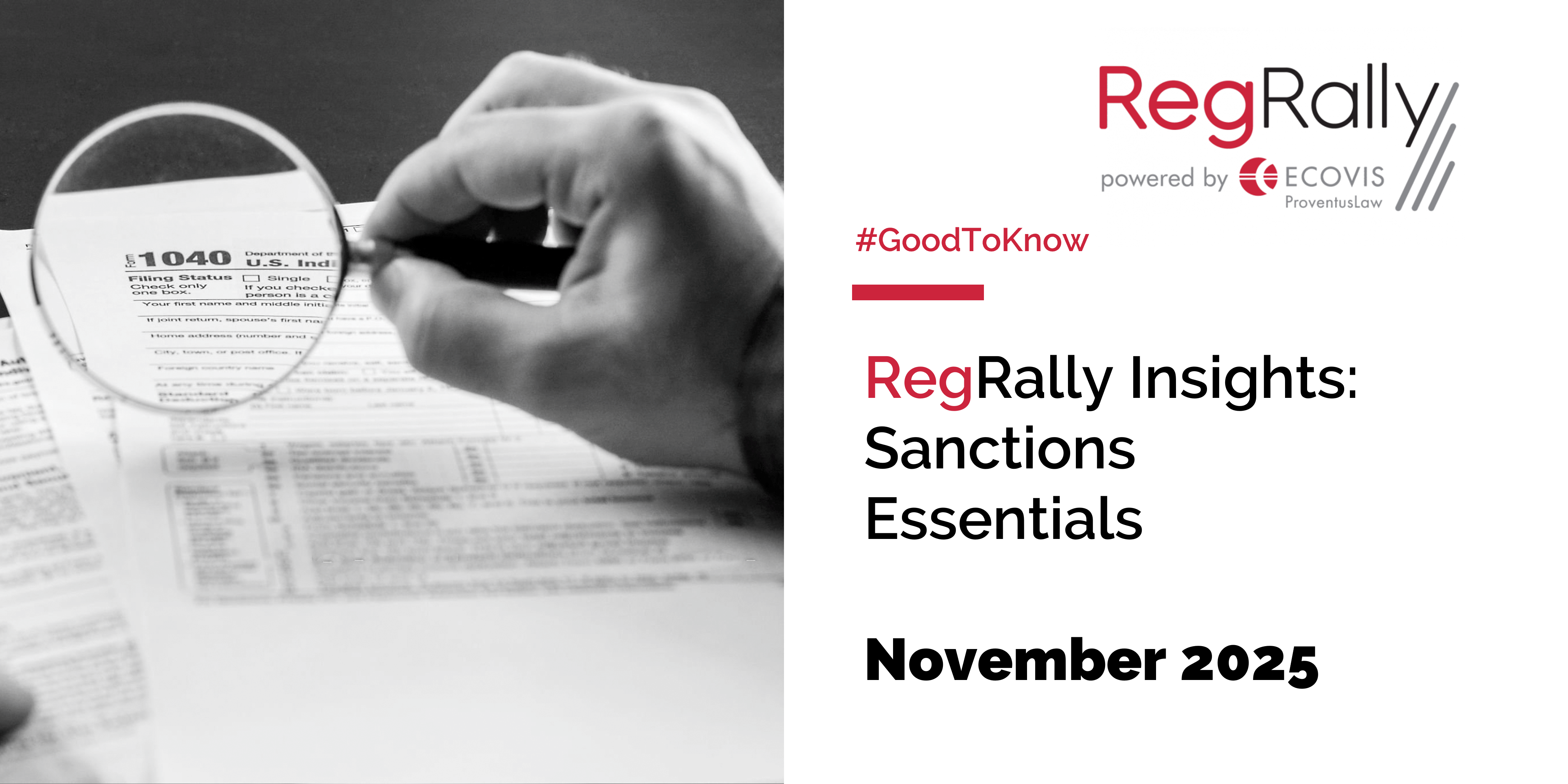Welcome to the monthly newsletter on Sanctions powered by ECOVIS ProventusLaw, dedicated to those who want to stay informed about the latest trends and developments, receive expert tips, and deepen their knowledge.
EU Adopts 19th Sanctions Package Targeting Russia’s Energy, Financial and Tech Sectors
The EU has approved its 19th package of sanctions against Russia, introducing the most comprehensive measures since 2023. The package includes a phased ban on Russian LNG, ending short-term imports within six months and terminating all long-term contracts by 2027.
The update extends asset freezes and restrictions to additional Russian banks, crypto service providers, and third-country actors involved in sanctions evasion. It also tightens controls on the movement of Russian diplomats and strengthens EU coordination on the enforcement and monitoring of circumvention. The measures target critical revenue streams of Russia’s wartime economy and signal increased EU scrutiny of financial flows and crypto-linked transactions.
ESMA Releases Second Consolidated Report on Sanctions, Highlighting 2024 Enforcement Trends
On 16 October 2025, the European Securities and Markets Authority (ESMA) published its Second Consolidated Report on Sanctions, summarising enforcement actions taken by EU national securities regulators in 2024. The data shows that more than 970 administrative sanctions and measures were issued—broadly in line with 2023—while total fines exceeded €100 million.
The most significant sanctions stemmed from breaches of the Market Abuse Regulation (MAR) and MiFID II. Over 60% of all measures involved financial penalties, and approximately 10% were resolved through settlement procedures, collectively accounting for more than €20 million in fines.
ESMA highlights substantial differences in sanctioning approaches across member states and reiterates the need for greater supervisory consistency. It also emphasises that sanctions represent just one component of the broader enforcement toolkit used to maintain market integrity across the Union.
OFAC Issues New Russia-Related General Licenses and Expands SDN Listings
On 22 October 2025, the U.S. Office of Foreign Assets Control (OFAC) issued several new Russia-related General Licenses, providing limited authorisations for certain transactions involving major Russian energy companies and infrastructure:
- General License 124A – Authorises petroleum services and transactions linked to the Caspian Pipeline Consortium and Tengizchevroil projects.
- General License 126 – Permits the wind-down of transactions involving Rosneft or Lukoil.
- General License 127 – Allows certain dealings in debt, equity, or derivative contracts involving Rosneft or Lukoil.
- General License 128 – Authorises specific transactions involving Lukoil retail service stations located outside Russia.
OFAC also updated its Specially Designated Nationals (SDN) List, adding a wide range of Russian oil and gas entities, including AO Kuibyshevsky Oil Refinery, Bashneft Dobycha, CJSC Vankorneft, JSC Vostsibneftegaz, JSC Rosneft International, OJSC Samotlorneftegaz, PJSC Verkhnechonskneftegaz, and others.
These additions carry a risk of secondary sanctions under Executive Order 14024, signalling heightened U.S. scrutiny of Russian energy sector activities and associated international transactions.
OFAC Updates Counter-Terrorism and Balkans Sanctions, Adds New Designations and Removes Four Individuals
On 17 October 2025, the U.S. Office of Foreign Assets Control (OFAC) announced updates to its counter-terrorism and Balkans-related sanctions programmes. The action includes the designation of two Haitian nationals linked to the terrorist organisation Viv Ansanm under Executive Order 13224, and the delisting of four individuals previously sanctioned under EO 14033.
Key implications for compliance teams:
• Update screening systems to include newly designated individuals and remove delisted ones to avoid false positives and missed matches.
• Review transactions and client relationships involving Haiti for potential terrorist financing exposure.
• Ensure internal sanctions lists, monitoring tools, and customer risk assessments reflect the latest OFAC changes.
OFAC Targets Iran-Backed Militia Networks and Adds New Energy and Shipping Sanctions
The U.S. Office of Foreign Assets Control (OFAC) has designated multiple individuals associated with Iran-backed militia groups under Executive Order 13224, expanding pressure on networks involved in terrorism and regional destabilisation. The action also introduces new entity listings tied to Iran’s energy export and shipping operations, signalling continued U.S. focus on disrupting revenue channels that support sanctioned groups.
In parallel, OFAC removed a Turkish shipyard from the Specially Designated Nationals (SDN) List in connection with Russia-linked activities, reflecting updated assessments of its involvement.


 Newsletter Subscription
Newsletter Subscription